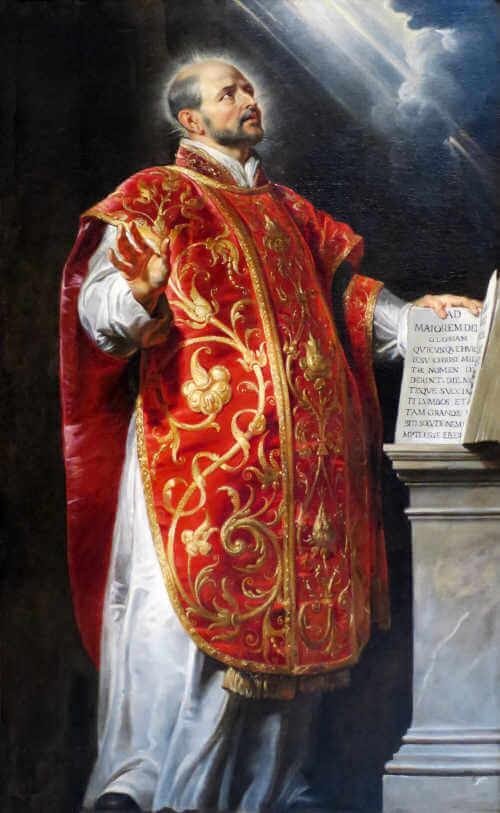Memorial of Saint Ignatius of Loyola, Priest
The Church in the liturgy often honored saints. Virtually every day is marked by the "presence" of a saint. Some are "universal" whom we remembered throughout the Church. Others, less known, whose cult is limited to the local dimension.
St. Ignatius of Loyola is one of the "universal" saints. Undoubtedly, what gives him such an important place in the Church is the small book of the Spiritual Exercises, which is not only a record of personal experiences (including mystical ones) of St. Ignatius, but some help for all who seek God in everyday life. The spiritual Exercise Book has been in use for four centuries and is still relevant and inspiring on our personal journey to God. Today, on the feast of St. Ignatius, let us ask: what does he want to tell us? What does he want to teach us? What to suggest? What to recall?
1. I think that St. Ignatius would like to remind us to build the foundation of our life on God, on Christ. We know this in theory, but in practice God is often far away. Although we do not reject him outright, we do not put him in the first place, but among other values, or we treat him instrumentally as if he were at our service.
For St. Ignatius, God was absolutely the first. Ignatius was a man very deeply united with God and a mystic. He experienced God not only in prayer and during the Eucharist, but in the simplest events of the day. Everything was leading Him to God. Even the three keys on the piano reminded him of the Holy Trinity.
Usually we also view reality as one-sided, naturalistically. Even in what is extraordinary and beautiful, we see chance or coincidence. If, like St. Ignatius, we would learn to look at reality as the key to the gift and instead of being pretentious we felt the need for gratitude, reality would slowly become "mystic", that is, a place of experiencing God and contacting Him.
2. St. Ignatius is a master of prayer. Of the many forms of prayer, he left behind in the Spiritual Exercises, he attached the greatest importance to the daily examination of conscience. When he was the general superior of the Jesuit order, during his illness he released his subordinates from all forms of prayer, except for examination of conscience.
Today we are very rushed, busy, overworked and exhausted, maybe even nervous. Therefore, we need this type of prayer. We need to pause for a moment and reflect: what is all this for? What is the point of that? Does it lead me to God? Does it bring you closer to people? Does it make you better? Such self-reflection leads to deeper self-awareness and freedom; it allows us to distance ourselves from many things and regain a lost peace.
3. St. Ignatius teaches love for the Church. One can even say that he founded the Order of the Society of Jesus out of love for the Church. The church in his time (16th century) was far from ideal; she was divided and torn by the Reformation. St. Ignatius was aware of all the errors of the Church, and yet he loved such a Church. In the Rules on cohabitation with the Church, he even recommends: in order to be sure in everything, we should always say that I will believe that the white I see is black, if the hierarchical Church says so, in the conviction that between Christ, our Lord and Spouse, and the Church, his Bride, is at work by the same Spirit who guides and governs us towards the salvation of other souls. Our holy mother, the Church, is governed and directed by the same Spirit and our Lord who gave us the Ten Commandments (Cd 365). His love was also the order - the Society of Jesus. However, he confessed to Fr. de Camara that if the Pope had decided to dissolve the Order, he would only need 15 minutes of prayer in the chapel to reconcile with it.
Today, relatively much is said about the Church. And it is generally said to be critical. The Church is most often identified with the hierarchy, with bishops and priests. Undoubtedly, this is a paradox that shows a lack of understanding of what the Church really is. St. Ignatius wants to tell us that wholesome criticism is needed and is conducive to growth, but it must be related to love. When Love is missing, we undercut our own roots.
4. St. Ignatius teaches us the correct vision of man and the world. St. Ignatius view of the world is optimistic, realistic and missionary. Optimistic, because he sees the world and man as God's work and the place of his presence and action. Realistic, because he sees sin and evil in the world. Missionary, because he looks at man and the world as an environment in which, despite evil, Jesus carries out his mission - he saves, he leads man to God.
Today there are many distortions in the approach to man and the world. Consumerism, utilitarianism, sensuality and egoism dominate. A person is treated as an object that is worn out and unnecessary in old age. Youth, vitality and productivity are advertised in the mass media. The value and dignity of man, created in God's image and likeness, is forgotten. In order not to succumb to these turbulence, we may need to return to the thoughts of St. Ignatius. And learn from him to look at the world in the key to real optimism.
I am aware that I only touched on some aspects of St. Ignatius. Perhaps, however, these few thoughts will inspire us to introduce ourselves to the figure of this great saint or to experience the Spiritual Exercises. Saint Ignatius invites you!
Until Tomorrow
fr. george


